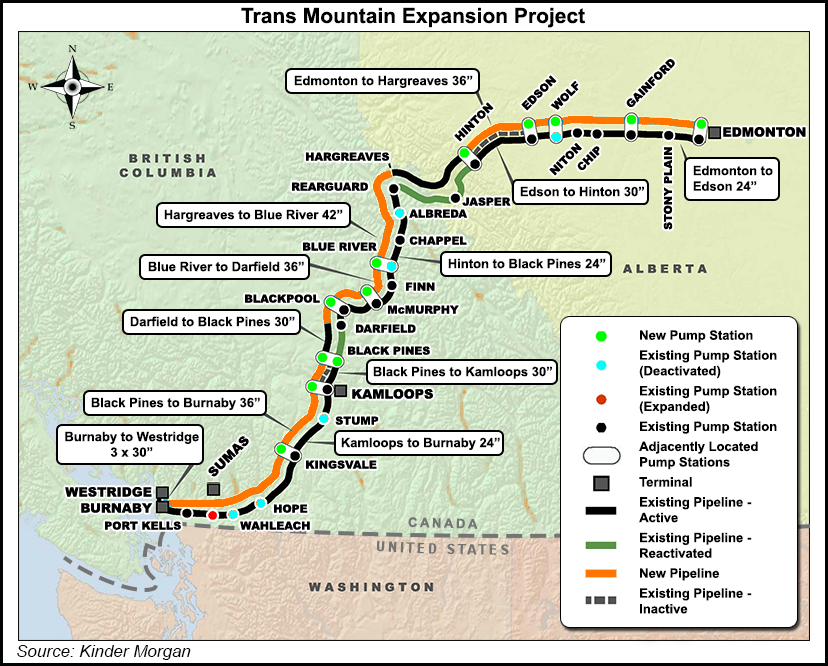E&P | NGI All News Access | NGI The Weekly Gas Market Report | Regulatory
Alberta Premier Calls for Investing in Trans Mountain as Kinder Morgan Suspends Work
After spending C$1.1 billion ($880 million) on five years of groping through a regulatory, legal and political maze without finding a clear path into construction, Kinder Morgan Canada Ltd. (KML) suspended work Sunday on its Trans Mountain Pipeline expansion.

The Calgary firm set a May 31 deadline for the federal, Alberta and British Columbia (BC) governments to tear down barricades against the C$7.4 billion ($5.9 billion) plan to triple capacity on the line to Vancouver from Edmonton to 590,000 b/d.
The project faces opposition by environmentalists, natives and BC’s left-leaning New Democratic Party government as a growth-enabling conduit for Pacific coast exports of Alberta thermal oilsands production, Canada’s top consumer of natural gas.
KML President Steve Kean portrayed the pause as a must, to avoid starting high-cost construction before obtaining assurance that the federal government will be able to enforce its 2016 regulatory approval against BC political resistance.
Opposition has escalated beyond appeals to the courts, which have to date upheld the project’s approvals by the National Energy Board (NEB) and the federal cabinet.
“Rather than achieving greater clarity, the Project is now facing unquantifiable risk,” said KML management. “Unfortunately BC has now been asserting broad jurisdiction and reiterating its intention to use that jurisdiction to stop the project. BC’s intention in that regard has been neither validated nor quashed, and the province has continued to threaten unspecified additional actions to prevent project success.”
Kean added, “A company cannot resolve differences between governments…While we have succeeded in all legal challenges to date, a company cannot litigate its way to an in-service pipeline amidst jurisdictional differences between governments.”
KML management warned that its deadline for a political settlement is firm.
“If we cannot reach agreement by May 31, it is difficult to conceive of any scenario in which we would proceed with the project. The time period for reaching a potential resolution is short, but necessarily so because of approaching construction windows, the time required to mobilize contractors, and the need to commit materials orders.”
The murk obscuring the project’s path includes a BC government threat to restrict Trans Mountain oil flows and tanker loadings during a long marine safety and spill inquiry. Alberta has countered with a vow to enact legislation enabling an oil supply boycott against BC.
The Alberta government also served up early tastes of trade war by having its liquor wholesale monopoly stop buying BC wine temporarily and by halting negotiations on increasing electricity purchases from the province.
KML’s move Sunday inspired strong statements by Alberta Premier Rachel Notley and federal Natural Resources Minister Jim Carr. But the political flurry stopped short of immediate actions, such as scheduling talks with BC Premier John Horgan.
A fractured provincial election last May only gave Horgan’s New Democratic Party (NDP) a precarious toehold on power with the largest minority of seats in the BC legislature. For his governing majority, he relies on support by the even more anti-pipeline Green Party.
“The government of Canada calls on Premier Horgan and the BC government to end all threats of delay to the Trans Mountain expansion,” Carr said. “His government’s actions stand to harm the entire Canadian economy.”
Carr added, “We will act in Canada’s national interest to see that this project is built.” He did not specify how. “With all our partners, we continue to consider all available options.”
In Edmonton, Notley called for federal action but did not specify any, extending an uninvited offer to buy an Alberta government ownership share in Trans Mountain to keep the expansion project alive.
“This pipeline must be built,” Notley said. “Tens of thousands of jobs and billions of dollars to the economy depend upon it. So do better schools and hospitals.” Notley leads a pro-development Alberta version of the NDP.
“Alberta is prepared to do whatever it takes to get this pipeline built, including taking a public position in the pipeline. Alberta is prepared to be an investor in the pipeline.”
© 2024 Natural Gas Intelligence. All rights reserved.
ISSN © 2577-9877 | ISSN © 1532-1266 | ISSN © 2158-8023 |
